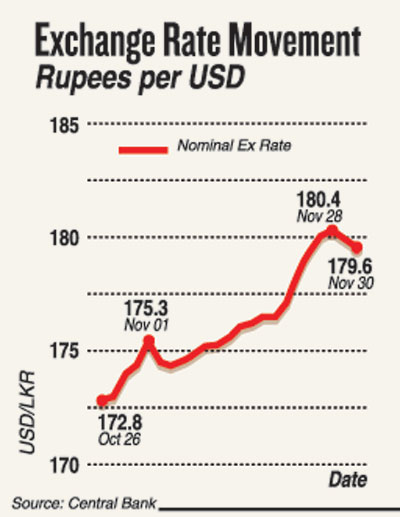News
Prices rise and profits dip as rupee continues to fall
View(s):The depreciation of the rupee against the the dollar, amid the political crisis, has affected businesses and resulted in prices increases.
Central Bank statistics show that the US dollar which was selling at Rs. 174.44 on October 26 – the day on which the political crisis erupted — was being sold at Rs. 181.45 as of Friday.
 Dhananath Fernando, Chief Operating Officer of the Advocata Institute, said political instability had given rise to an economic crisis and called on the President and all political party leaders to come together and take immediate steps to resolve the matter. He pointed out that the depreciation of the rupee had hit the people hard, with prices of essential items rising, while importers had also been affected.
Dhananath Fernando, Chief Operating Officer of the Advocata Institute, said political instability had given rise to an economic crisis and called on the President and all political party leaders to come together and take immediate steps to resolve the matter. He pointed out that the depreciation of the rupee had hit the people hard, with prices of essential items rising, while importers had also been affected.
He said that as a result of the prolonged political crisis, investor confidence had dropped and the International Monetary Fund had decided to suspend loans to Sri Lanka. The fall of the rupee has also affected the agro-chemical sector, which plays a vital role in importing and distributing agro-chemicals.
Pointing out that the rupee had depreciated by 18 percent over the past three months, CropLife Sri Lanka spokesman Senarath Kiriwaththuduwage said agro-chemicals importers would be forced to increase the prices by at least 20 percent if the rupee depreciation continued for three more months.He said the agro-chemical companies would not be able to cushion the loss and would have to increase the prices.
With the Christmas season approaching, one might expect sales to sky-rocket during December. However, this was not so, this year. Trader Rajan Rajakaruna who sells imported fruits and milk powder said he was compelled to sell his items at higher prices due the the depreciation of the rupee.
The construction sector has also been badly hit by the depreciation of the rupee. Buddhi Perera, Project Manager of Sanken Construction (Pvt) Ltd., said the economic instability had created a feeling of uncertainty in the industry. “Now we cannot negotiate price escalation margins with our clients as the rupee’s depreciation was rapid.”
Also affected by the rupee depreciation is the pharmaceutical sector. Pharmaceutical companies say they had been hit badly because the previous government had imposed a price ceiling on 74 essential drugs. The prices were set when the rupee was relatively stable. But with the rupee depreciating rapidly, the companies were finding it difficult to adhere to the price ceiling and were incurring huge losses.
Dr. Kamal Jaysinghe, Chief Executive Officer of the National Medicines Regulatory Authority, said the NMRA had received requests to revise the regulatory prices on essential drugs. “The Sri Lanka Chamber of the Pharmaceutical Industry (SLCPI) has requested us to revise the prices imposed on essential drugs,” he said, adding that a special committee chaired by Dr. Palitha Abeykoon was studying the request.
Meanwhile, money changers said people were not willing to convert dollars into rupees. At Royal Money Exchange, an employee said customers coming to change dollars into rupees had dropped by 40 percent.

